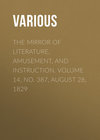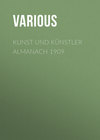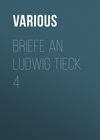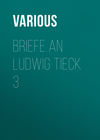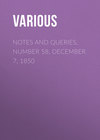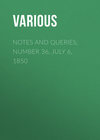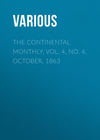Buch lesen: «The Mirror of Literature, Amusement, and Instruction. Volume 14, No. 387, August 28, 1829», Seite 3
"We now determined to proceed towards the Red Indians' Lake, sanguine that, at that known rendezvous, we could find the objects of our search.
"In about ten days we got a glimpse of this beautifully majestic and splendid sheet of water. The ravages of fire, which we saw in the woods for the last two days, indicated that man had been near. We looked down on the lake, from the hills at the northern extremity, with feelings of anxiety and admiration:—No canoe could be discovered moving on its placid surface, in the distance. We were the first Europeans who had seen it in an unfrozen state, for the three former parties who had visited it before, were here in the winter, when its waters were frozen and covered over with snow. They had reached it from below, by way of the River Exploits, on the ice. We approached the lake with hope and caution; but found to our mortification that the Red Indians had deserted it for some years past. My party had been so excited, so sanguine, and so determined to obtain an interview of some kind with these people, that, on discovering from appearances every where around us, that the Red Indians—the terror of the Europeans as well as the other Indian inhabitants of Newfoundland—no longer existed, the spirits of one and all of us were very deeply affected. The old mountaineer was particularly overcome. There were every where indications, that this had long been the central and undisturbed rendezvous of the tribe, when they had enjoyed peace and security. But these primitive people had abandoned it, after having been tormented by parties of Europeans during the last eighteen years. Fatal rencounters had on these occasions unfortunately taken place."
(To be concluded in our next.)
THE SELECTOR, AND LITERARY NOTICES OF NEW WORKS
AN HONOURABLE "INDEPENDENT" FAMILY
The Honourable Mister Augustus Headerton, who lived once in yonder villa, was the youngest of eleven children, and consequently the junior brother of the noble Lord of Headerton, nephew of the Honourable Justice Cleaveland, nephew of Admiral Barrymore, K.C.B., &c. &c. &c.; and cousin first, second, third, fourth, fifth, sixth, or seventh remove—to all the honourables and dishonourables in the country.
When the old earl died, he left four Chancery suits, and a nominal estate to the heir apparent, to whom he also bequeathed his three younger brothers and sisters, who had only small annuities from their mother's fortune, being assured that (to use his own words), "he might depend on him for the honour of the family, to provide for them handsomely." And so he did (in his own estimation); his lady sisters had "the run of the house," and Mr. Augustus Headerton had the run of the stables, the use of hunters and dogs, and was universally acknowledged to possess "a proper spirit," because he spent three times more than his income. "He bates the world and all, for beauty, in a hunting jacket," exclaimed the groom. "He flies a gate beyant any living sowl I iver seed, and his tallyho, my jewel—'twould do y'er heart good to hear his tallyho!" said my lord's huntsman. "He's a generous jontleman as any in the kingdom—I'll say that for him, any day in the year," echoed the coachman. "He's admired more nor any jintleman as walks Steven's Green in a month o' Sundays, I'll go bail," continued Miss Jenny Roe, the ladies' maid.
"Choose a profession!" Oh! no; impossible. An Irish gentleman choose a profession! But the Honourable Mr. Augustus Headerton chose a wife, and threw all his relations, including Lord Headerton, the Honourable Justice Cleaveland, Admiral Barrymore, K.C.B., and his cousins to the fiftieth remove, into strong convulsions, or little fits. She, the lady, had sixty thousand pounds; that, of course, they could not object to. She had eloped with the Honourable Mr. Augustus Headerton;—mere youthful indiscretion. She was little and ugly;—that only concerned her husband. She was proud and extravagant;—those (they said) were lady-like failings. She was ignorant and stupid;—her sisters-in-law would have pardoned that. She was vulgar;—that was awkward. Her father was a carcass butcher in Cole's Lane market—death and destruction!
It could never be forgiven! the cut direct was unanimously agreed on, and the little lady turned up her little nose in disdain, as her handsome barouche rolled past the lumbering carriage of the Right Honourable Lord Headerton. She persuaded her husband to purchase that beautiful villa, in view of the family domain, that she might have more frequent opportunities of bringing, as she elegantly expressed it, "the proud beggars to their trumps;—and why not?—money's money, all the world over." The Honourable Mister Augustus depended on his agent for the purchase, and some two thousand and odd pounds were consequently paid, or said to have been paid, for it, more than its value. And then commenced the general warfare; full purse and empty head—versus no purse, and old nobility. They had the satisfaction of ruining each other—the full purse was emptied by devouring duns, and the old nobility suffered by its connexion with vulgarity.
"I want to know, Honourable Mister Augustus Headerton"—(the lady always gave the full name when addressing her husband; she used to say it was all she got for her money),—"I want to know, Honourable Mister Augustus Headerton, the reason why the music master's lessons, given to the Misses Headerton (they were blessed with seven sweet pledges of affection), have not been paid for? I desired the steward to see to it, and you know I depend on him to settle these matters."
The Honourable Mrs. Augustus Headerton rang the bell—"Send Martin up."
"Mister Martin," the lady began, "what is the reason that Mr. Langi's account has not been paid?"
"My master, ma'am knows that I have been anxious for him to look over the accounts; the goings-out are so very great, and the comings-in, as far as I know"—The Honourable Mister Augustus Headerton spilt some of the whiskey-punch he was drinking, over a splendid hearth-rug, which drew the lady's attention from what would have been an unpleasant eclaircissement.
"I cannot understand why difficulties should arise. I am certain I brought a fortune large enough for all extravagance," was the lady's constant remark when expenditure was mentioned. Years pass over the heads of the young—and they grow old; and over the heads of fools—but they never grow wise.
The Honourable Mister and Mistress Augustus Headerton were examples of this truth;—their children grew up around them—but could derive no support from their parent root. The mother had depended on governesses and masters for the education of her girls—and on their beauty, connexions, or accomplishments, to procure them husbands. The father did not deem the labours of study fit occupation for the sons of an ancient house:—"Depend upon it," he would say, "they'll all do well with my connexions—they will be able to command what they please." The Honourable Mistress Augustus could not now boast of a full purse, for they had long been living on the memory of their once ample fortune.
The Honourable Mister Augustus Headerton died, in the forty-fifth year of his age, of inflammation, caught in an old limekiln, where he was concealed to avoid an arrest for the sum of 180 guineas, for black Nell, the famous filly, who won the cup on the Curragh of Kildare—purchased in his name, but without his knowledge, by his second son, the pride of the family—commonly called dashing Dick.
All I know further of the Honourable Mistress Augustus Headerton is, that
"She played at cards, and died."
Miss Georgiana—the beauty, and greatest fool of the family, who depended on her face as a fortune, did get a husband—an old, rich West India planter, and eloped, six months after marriage, with an officer of dragoons.
Miss Celestina was really clever and accomplished. "Use her abilities for her own support!" Oh, no! not for worlds—Too proud to work, but not too proud to beg, she depended on her relations, and played toady to all who would.
Miss Louisa—not clever; but in all other respects, ditto—ditto.
Miss Charlotte was always very romantic; refused a respectable banker with indignation, and married her uncle's footman—for love.
Having sketched the female part of the family first (a compliment by the way they do not always receive from their own sex)—I will tell you what I remember of the gentlemen.
"The Emperor," as Mr. Augustus was called, from his stately manner and dignified deportment, aided by as much self-esteem as could well be contained in a human body, depended, without any "compunctuous visitings of conscience," on the venison, claret, and champagne of his friends, and thought all the time he did them honour:—and thus he passed his life.
"Dashing Dick" was the opposite of the Emperor; sung a good song—told a good story—and gloried in making ladies blush. He depended on his cousin, Colonel Bloomfield, procuring him a commission in his regiment, and cheated tailors, hosiers, glovers, coach-makers, and even lawyers, with impunity. Happily for the world at large, Dashing Dick broke his neck in a steeple chase, on a stolen horse, which he would have been hanged for purloining, had he lived a day longer.
Ferdinand was the bonne-bouche of the family: they used to call him "the Parson!" Excellent Ferdinand!—he depended on his exertions; and, if ever the name of Headerton rises in the scale of moral or intellectual superiority, it will be owing to the steady and virtuous efforts of Mister Ferdinand Headerton, merchant, in the good city of B–.
Sketches of Irish Character, by Mrs. S.C. Hall.
PURSUIT OF KNOWLEDGE UNDER DIFFICULTIES
We quote the following from the portion of the Library of Entertaining Knowledge, with the above title—to show the mode in which the heads of the respective chapters are illustrated:
Obscure Origin.
"The parents of SEBASTIAN CASTALIO, the elegant Latin translator of the Bible, were poor peasants, who lived among the mountains in Dauphiny.
"The Abbé HAUTEFEUILLE, who distinguished himself in the seventeenth century, by his inventions in clock and watch making, was the son of a baker.
"PARINI, the modern satiric poet of Italy, was the son of a peasant, who died when he was in his boyhood, and left him to be the only support of his widowed mother; while, to add to his difficulties, he was attacked in his nineteenth year by a paralysis, which rendered him a cripple for life.
"The parents of Dr. JOHN PRIDEAUX, who afterwards rose to be Bishop of Worcester, were in such poor circumstances, that they were with difficulty able to keep him at school till he had learned to read and write; and he obtained the rest of his education by walking on foot to Oxford, and getting employed in the first instance as assistant in the kitchen of Exeter College, in which society he remained till he gradually made his way to a fellowship.
"The father of INIGO JONES, the great architect, who built the Banqueting-house at Whitehall, and many other well known edifices, was a cloth-worker; and he himself was also destined originally for a mechanical employment.
"Sir EDMUND SAUNDERS, Chief Justice of the Court of King's Bench in the reign of Charles II., was originally an errand boy at the Inns of Court, and gradually acquired the elements of his knowledge of the law by being employed to copy precedents.
"LINNAEUS, the founder of the science of Botany, although the son of the clergyman of a small village in Sweden, was for some time apprenticed to a shoemaker; and was only rescued from his humble employment by accidentally meeting one day a physician named Rothman, who, having entered into conversation with him, was so much struck with his intelligence, that he sent him to the university.
"The father of MICHAEL LOMONOSOFF, one of the most celebrated Russian poets of the last century, and who eventually attained the highest literary dignities in his own country, was only a simple fisherman. Young Lomonosoff had great difficulty in acquiring as much education as enabled him to read and write; and it was only by running away from his father's house, and taking refuge in a monastery at Moscow, that he found means to obtain an acquaintance with the higher branches of literature.
"The famous BEN JONSON worked for some time as a bricklayer or mason; 'and let not them blush,' says Fuller, speaking of this circumstance in his "English Worthies," with his usual amusing, but often expressive quaintness, 'let not them blush that have, but those that have not, a lawful calling. He helped in the building of the new structure of Lincoln's Inn, when, having a trowel in his hand, he had a book in his pocket.'
"PETER RAMUS, one of the most celebrated writers and intrepid thinkers of the sixteenth century, was employed in his childhood as a shepherd, and obtained his education by serving as a lacquey in the College of Navarre.
"The Danish astronomer, LONGOMONTANUS, was the son of a labourer, and, while attending the academical lectures at Wyburg through the day, was obliged to work for his support during a part of the night.
"The elder DAVID PAREUS, the eminent German Protestant divine, who was afterwards Professor of Theology at Heidelberg, was placed in his youth as an apprentice, first with an apothecary, and then with a shoemaker.
"HANS SACHS, one of the most famous of the early German poets, and a scholar of considerable learning, was the son of a tailor, and served an apprenticeship himself, first to a shoemaker, and afterwards to a weaver, at which last trade, indeed, he continued to work during the rest of his life.
"JOHN FOLCZ, another old German poet, was a barber.
"LUCAS CORNELISZ, a Dutch painter of the sixteenth century, who visited England during the reign of Henry VIII., and was patronized by that monarch, was obliged, while in his own country, in order to support his large family, to betake himself to the profession of a cook.
"Dr. ISAAC MADDOX, who, in the reign of George II., became bishop, first of St. Asaph, and then of Worcester, and who is well known by his work in defence of the Doctrine and Discipline of the Church of England, lost both his parents, who belonged to a very humble rank of life, at an early age, and was, in the first instance, placed by his friends with a pastrycook.
"The late Dr. ISAAC MILNER, Dean of Carlisle, and Lucasian Professor of the Mathematics at Cambridge, who had the reputation of one of the first mathematicians of that University, and who published some ingenious papers on Chemistry and Natural Philosophy, in the 'Philosophical Transactions,' was originally a weaver—as was also his brother JOSEPH, the well known, author of a 'History of the Church.' Of the same profession was also, in his younger days, the late Dr. JOSEPH WHITE, Professor of Arabic at Oxford.
"CASSERIO, a well known Italian anatomist, was initiated in the elements of Medical Science by a surgeon of Padua, with whom he had lived originally as a domestic servant.
"JOHN CHRISTIAN THEDEN, who rose to be chief surgeon to the Prussian army under Frederick II. had in his youth been apprenticed to a tailor."
Influence of Accident in directing Pursuits.
"The celebrated Bernard Palissy, to whom France was indebted, in the sixteenth century, for the introduction of the manufacture of enamelled pottery, had his attention first attracted to the art, his improvements in which, form to this time the glory of his name among his countrymen, by having one day seen by chance a beautiful enamelled cup, which had been brought from Italy. He was then struggling to support his family by his attempts in the art of painting, in which he was self-taught; and it immediately occurred to him that, if he could discover the secret of making these cups, his toils and difficulties would be at an end. From that moment his whole thoughts were directed to this object; and in one of his works he has himself given us such an account of the unconquerable zeal with which he prosecuted his experiments, as it is impossible to read without the deepest interest. For some time he had little or nothing to expend upon the pursuit which he had so much at heart; but at last he happened to receive a considerable sum of money for a work which he had finished, and this enabled him to commence his researches. He spent the whole of his money, however, without meeting with any success, and he was now poorer than ever. Yet it was in vain that his wife and friends besought him to relinquish what they deemed his chimerical and ruinous project. He borrowed more money, with which he repeated his experiments; and, when he had no more fuel wherewith to feed his furnaces, he cut down his chairs and tables for that purpose. Still his success was inconsiderable. He was now actually obliged to give a person, who had assisted him, part of his clothes by way of remuneration, having nothing else left; and, with his wife and children starving before his eyes, and by their appearance silently reproaching him as the cause of their sufferings, he was at heart miserable enough. But he neither despaired, nor suffered his friends to know what he felt; persevering, in the midst of all his misery, a gay demeanour, and losing no opportunity of renewing his pursuit of the object which he all the while felt confident he should one day accomplish. And at last, after sixteen years of persevering exertion, his efforts were crowned with complete success, and his fortune was made. Palissy was, in all respects, one of the most extraordinary men of his time; in his moral character displaying a high-mindedness and commanding energy altogether in harmony with the reach and originality of conception by which his understanding was distinguished. Although a Protestant, he had escaped, through the royal favour, from the massacre of St. Bartholomew; but, having been soon after shut up in the Bastille, he was visited in his prison by the king, who told him, that if he did not comply with the established religion, he should be forced, however unwillingly, to leave him in the hands of his enemies. 'Forced!' replied Palissy, 'This is not to speak like a king; but they who force you cannot force me; I can die!' He never regained his liberty, but ended his life in the Bastille, in the ninetieth year of his age."
